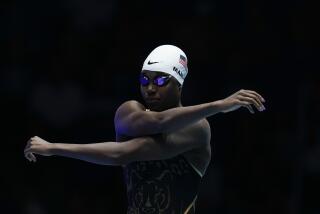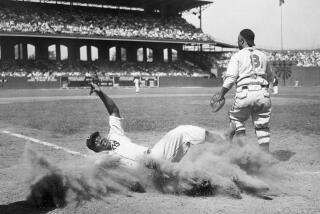Commentary : Should Players’ Color Make a Difference?
Today, we celebrate the birth of Martin Luther King and, coincidentally, the 1-year anniversary of Jimmy “the Greek” Snyder’s lecture on black physiology.
As you must recall, the Greek suggested in a television interview that blacks were superior athletes because their thighs were larger. And in his own special application of Darwinian theory, he explained that slave owners had successfully bred a superior physical specimen, meaning we had Simon Legree to thank for Bo Jackson.
We know what happened to the Greek, and we only wished it had happened sooner. But just because Snyder has been banished does not mean the issue has disappeared with him.
The Greek notwithstanding, there is clear, anecdotal evidence that blacks are superior athletes, particularly where speed and jumping ability count. Blacks dominate professional basketball, and it is jokingly held that players of either race who can’t jump are stricken with white man’s disease. The speed positions in football, such as running back, wide receiver and cornerback, are the near-exclusive preserve of blacks. A white boxer is a rarity. And in baseball, where blacks are in the minority, they are still well-represented on All-Star teams.
The question is: Why?
If there is a physiological difference, it has never been shown. Or is this simply a matter of socioeconomics, in which the ethnic or racial group on the bottom of the ladder seeks sports as both a release and a possible escape route?
The question was put to Dr. Bill Howard, the head of sports medicine at Baltimore’s Union Memorial Hospital.
“You’re opening a Pandora’s box,” he said. “It’s a very politically charged issue and one that has never been studied properly.”
The danger in such a study is obvious. If blacks are found somehow different from whites physiologically, it is a very small leap to conclude they might be different in other ways, too.
Jomills Braddock, a professor of sociology at Johns Hopkins University, has studied race in sports and is familiar with much of the available literature. He, too, knows the anecdotal evidence and is convinced the answer is rooted in sociology, not physiology.
“My own sense is that cultural, social and economic practices have a lot to do with it,” he said. “When black youth see sport as an avenue of upward mobility, when they’re exposed to many role models in those areas and to few in other fields, their aspirations tend to be influenced by what they can see.
“A similar argument is the positional one in football. Some have argued that a biological difference, both cognitive and physical, has placed blacks as running backs and flankers, as opposed to the so-called thinking positions. The counter argument seems to be more valid, that blacks, on the one hand, aspire to play positions where they see the visible role models and that, secondly, there is some shifting of black and white players. There are many blacks who play quarterback in high school who are shifted when they go to college. And there are black college quarterbacks, some who have led teams to national championships, who are shifted when they turn pro.”
The scientific literature is almost non-existent. Dr. Daniel Funk, an assistant professor in orthopedic surgery at Ohio State, said no study had ever shown any compelling evidence of physiological difference.
“If you asked me, I would say it’s a matter of training, rather than anything physiological,” Funk said. “I believe it has to do with training, social background and desire. My impression is that, given the same training level and desire for competition, whites and blacks would compete equally.”
Howard isn’t so sure. He sees the anecdotal difference and wonders if there isn’t a reason beyond sociology.
“I think it is proven that blacks excel as running backs and flankers, and we’ve all heard of white man’s disease. If you work hard enough at it, you might learn to box or to hit a curveball. But it’s pretty hard to learn to run fast or jump high. Believe me, I’ve tried.
“We know that those on the low end economically often achieve well in sports. But isn’t it possible that running and jumping are traits, like blue eyes or blond hair?’
’
Howard is aware of the implications and concerned by them.
“We need more studies,” he said. “We need controlled studies by wise, honest, decent people.”
I’m waiting to see evidence before I’m convinced this phenomenon is anything other than sociological. I know there were great Jewish boxers in the 1920s and Italians were prevalent in baseball in the 1940s. Great athletes have always been generated from the lowest economic classes. And I see now that Asian children are succeeding at spectacular levels in the classroom, just as other immigrant ethnic groups had before them. I’m no more convinced that Asians are innately smarter than anyone else than I am that blacks are genetically superior physically.
But maybe there’s another point to consider. Why do we continue to count how many blacks and how many whites there are on a basketball court? Does it matter? Should it matter? As a strictly scientific concern, the apparent superiority of blacks in sports is an interesting study. But as we celebrate Dr. King’s birthday, we might wonder whether a more important study would be why we remain so hung up on matters of race.
More to Read
Go beyond the scoreboard
Get the latest on L.A.'s teams in the daily Sports Report newsletter.
You may occasionally receive promotional content from the Los Angeles Times.










